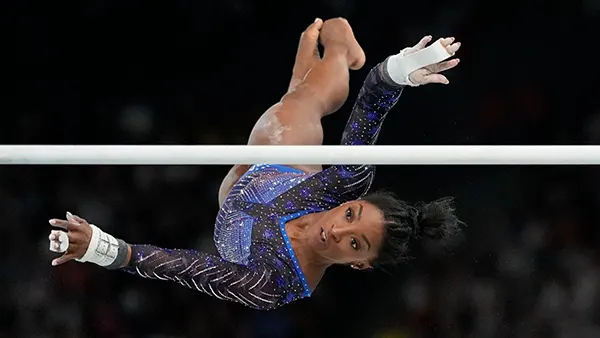Simone Biles has long been recognised as one of the most influential figures in gymnastics, redefining what it means to succeed at the highest level. Following her remarkable return to competitive sport after stepping back during the Tokyo 2021 Olympics, her journey has continued to inspire millions. In 2025, she remains a central voice in discussions about mental health, resilience, and the balance between personal well-being and athletic ambition.
Achievements and Recognition Beyond Medals
In July 2025, Simone Biles received significant recognition at the ESPY Awards, securing the Best Athlete in Women’s Sports title. This honour highlighted her ability not only to achieve outstanding competitive results but also to drive positive changes across the sporting community. The award also reflected her broader impact beyond gymnastics, as she became a symbol of courage in addressing psychological struggles publicly.
Biles has been instrumental in raising awareness about the challenges faced by elite athletes. By sharing her own experiences with stress and anxiety, she has encouraged athletes across different disciplines to speak more openly about their struggles. This openness has sparked meaningful changes within sporting organisations, many of which now incorporate more comprehensive mental health support programmes.
Her legacy is not solely tied to the medals and titles she has earned. Instead, Biles’ story is also about resilience, advocacy, and the ability to reshape the narrative of what it means to be a successful athlete in the 21st century. Her influence continues to extend well beyond the floor of the gymnastics arena.
The Broader Impact of Biles’ Voice
Simone Biles’ advocacy has resonated strongly with younger gymnasts, who now feel more empowered to prioritise their mental health without fear of stigma. The cultural shift she helped create demonstrates the growing recognition that mental resilience is just as critical as physical strength in modern sport.
Sports organisations have started adopting new frameworks inspired by Biles’ openness. Programmes that once focused almost entirely on physical conditioning now include psychological support, mindfulness training, and resources for emotional well-being. This development reflects a broader societal movement towards recognising the human side of high-performance sport.
Biles has also become a role model outside sport, partnering with schools, non-profit organisations, and health campaigns to promote mental health awareness. Her ability to use her global profile responsibly has ensured that her voice reaches audiences far beyond the gymnastics community.
Managing Stress in the World of Gymnastics
Gymnastics is widely acknowledged as one of the most demanding sports, requiring extreme levels of precision, strength, and discipline. The pressure to perform consistently at an elite level can create significant psychological challenges. Simone Biles’ candid accounts of her struggles with “the twisties” during the Tokyo Olympics remain a powerful reminder of the invisible battles athletes face.
Sports psychologists emphasise that mental health care is now a critical part of any successful training regime. Techniques such as visualisation, breathing exercises, and cognitive behavioural strategies have become standard practice among top gymnasts. These methods not only improve focus but also protect athletes from the long-term effects of stress and burnout.
Within gymnastics academies and national teams, there is a growing focus on creating an environment that values both performance and well-being. Biles’ journey has become a case study in how openness and self-care can contribute to sustainable careers, showing future generations that protecting mental health is not a weakness but a strength.
How Gymnasts Protect Their Mental Well-being
Many gymnasts now work closely with mental health professionals, treating psychological support as essential as physical training. Regular check-ins, therapy sessions, and group discussions are increasingly common, reducing the isolation that athletes sometimes feel in high-pressure environments.
Nutrition, rest, and recovery also play a vital role in supporting mental stability. Experts highlight that balanced diets, adequate sleep, and scheduled rest days are crucial not only for physical performance but also for maintaining emotional balance. These elements have become central pillars of long-term success in gymnastics.
Importantly, peer support within teams has gained recognition as a protective factor. Gymnasts encourage each other to share experiences, helping to normalise conversations about anxiety, confidence, and motivation. This shift demonstrates a broader cultural move towards compassion in competitive sport.

Future Goals and Avoiding Burnout
Looking ahead to the next major championships, including the World Artistic Gymnastics Championships and the 2028 Los Angeles Olympics, Simone Biles has expressed a cautious but determined outlook. She has highlighted the importance of pacing herself, acknowledging that longevity in gymnastics depends on careful management of both body and mind.
Her training plan now integrates more flexibility, allowing for recovery and personal time. This balanced approach has been embraced by coaches and medical staff, ensuring that Biles can continue competing without jeopardising her health. It also serves as a blueprint for younger athletes aiming for long-term careers.
Beyond competition, Biles is expected to continue her advocacy work, mentoring younger gymnasts and speaking publicly about her journey. This dual focus on performance and personal well-being positions her as a figure who not only competes at the highest level but also shapes the future culture of sport.
The Roadmap for Sustained Success
Experts argue that one of the greatest challenges for athletes like Biles is maintaining motivation without succumbing to exhaustion. Strategic rest periods, diversified training, and strong support networks are increasingly recognised as essential for preventing burnout.
Biles’ example demonstrates that success is not simply about maximising training hours. Instead, it involves balance, adaptability, and the courage to step back when necessary. This philosophy has gained traction across many sports, reflecting a new understanding of how athletes can thrive in demanding careers.
As the world prepares to witness more of Simone Biles’ extraordinary journey, her story remains a reminder that true greatness lies not only in physical performance but also in the strength to protect one’s mental health and inspire others along the way.
